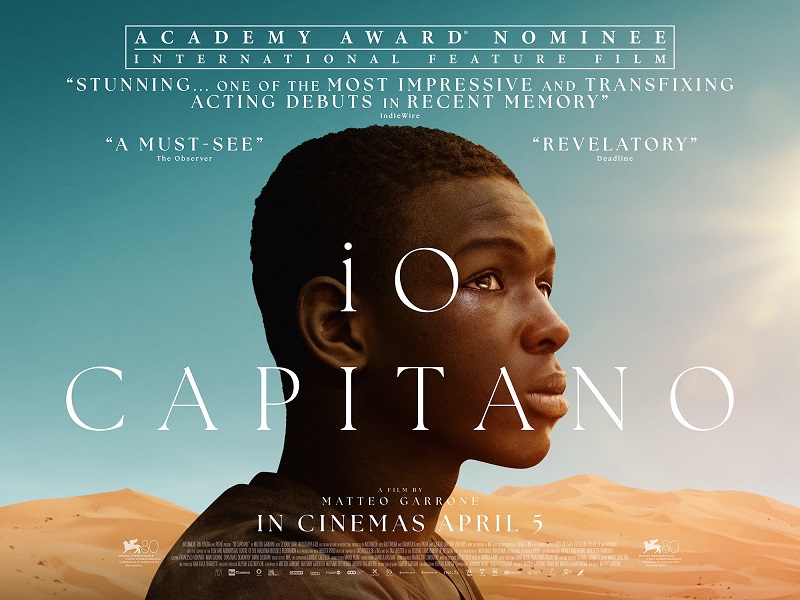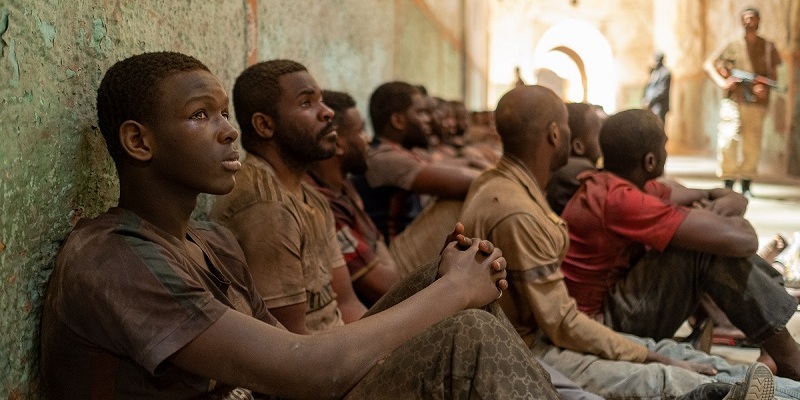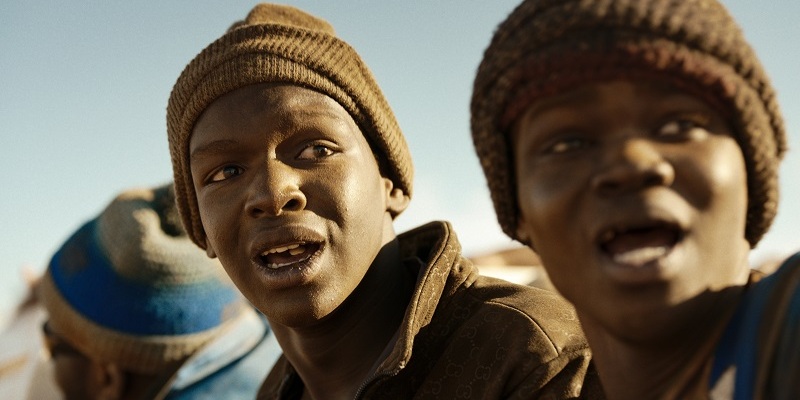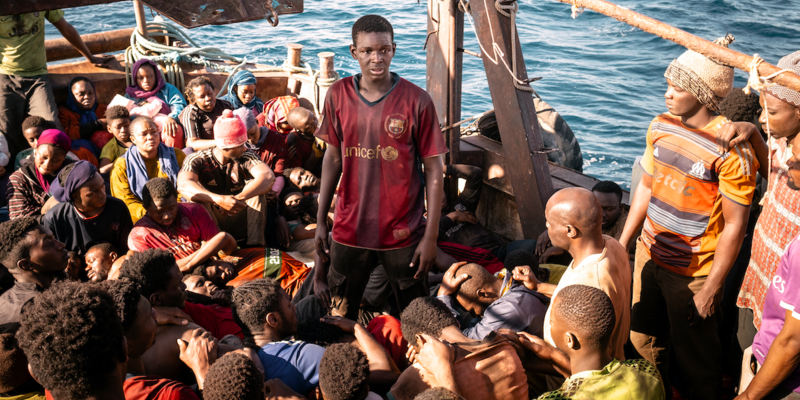
Review by
Eric Hillis
Directed by: Matteo Garrone
Starring: Seydou Sarr, Mustapha Fall, Issaka Sawagodo, Hichem Yacoubi, Doodou Sagna, Khady Sy

There's a key moment in Paul Greengrass's modern piracy drama
Captain Phillips in which a Somalian hijacker points a
machine gun at Tom Hanks' titular seafarer and proclaims "I'm the
captain now." Whether intentional on Greengrass's part or not, it's a
striking moment that plays into replacement theory fears of white
westerners whose greatest nightmare in life is having their possessions
taken away by an African. Matteo Garrone's
Io Capitano features a scene in which a young African man
repeatedly screams "I'm the captain!" as he commandeers a boat, but the
effect couldn't be more different. The young African man, or rather boy,
here isn't some anonymous "other", he's a character who has been
humanised over the preceding two hours.

The boy in question is Seydou (Seydou Sarr), a Senegalese teen
who along with his cousin Moussa (Moustapha Fall), dreams of
emigrating to Europe. He tells his disapproving mother his goal is to
earn money which he can send back home, but in Moussa's company the boys
dream about becoming music stars, with "white people asking for
autographs." The adults in their lives try to dissuade the boys from
making the deadly journey, but their pleas are ignored as Seydou and
Moussa slip away one night and begin their fraught journey north.
Garrone keeps his perspective on the two boys, shifting to that of
Seydou when they become separated at one point. We see the journey
through their eyes, which are initially blinkered but gradually open
wide to the true hardships they must face. It all starts off as
something of a Boys' Own adventure as Seydou and Moussa embark on what
is for a few hundred miles at least, the sort of trip western tourists
might make on a gap year. They find solidarity among fellow Senegalese
would-be emigrants who share tips about how best to survive the journey.
It seems the trip may not be so bad after all. That's until they reach
Libya, where things take a significantly dark turn. The migrants are
stopped at the border by men in military outfits. Are they the police?
The army? Gangsters? Terrorists? Do such distinctions matter? Robbed of
their money, the migrants are either sent to prison or worse, to a
modern day slave market where they're tortured and abused until the day
some wealthy Arab decides to purchase them. The shores of Europe have
never seemed further away.

No doubt keen to avoid accusations of fraudulence and sensationalism,
Garrone and his co-writers (Massimo Gaudioso, Massimo Ceccherini
and Andrea Tagliaferri) worked in collaboration with a group of
Senegalese migrants who had made the same journey (Kouassi Pli Adama Mamadou, Arnaud Zohin, Amara Fofana, Brhane
Tareke
and Siaka Doumbia). There are horrors here so dark they could
only have come from real exposure to humanity at its worst, but also
contrasting moments of kindness and solidarity. The Libyan sequences are
as disturbing as the worst torture porn, but they're offset by the
spirit of community we see among the Senegalese migrants stuck in a
limbo-esque Tripoli, working for a pittance to scrape together the money
to book a passage on a trafficker's boat to Italy.
Newcomers Sarr and Fall are quite the find, especially the former, who
seems to grow from a naïve child into a hardened adult before our eyes.
As the bright colours of his replica FC Barcelona jersey turn muted from
a mix of sand, grit and dust, so too does Seydou lose his childish
vibrancy as he's forced to quickly become a man.

In Sarr's resilient Seydou, Io Capitano certainly puts a
face to a statistic. It's hard to think of anyone coming away from a
viewing of Garrone's film without some empathy or at least grudging
respect for the thousands like Sarr who risk all for a better life on a
daily basis. At the same time, I doubt Io Capitano will
change many minds on this thorny issue, and may well strengthen rigid
opinions. For liberals it will simply be a case of preaching to the
crowd, while conservatives will point to the fact that Seydou and Moussa
are economic migrants leaving a perfectly safe life at home. Garrone's
film probably won't change your political views, but it's a vital piece
of filmmaking nonetheless. The undocumented deserve to at least have
their stories documented.

Io Capitano is on MUBI UK from June 21st.

